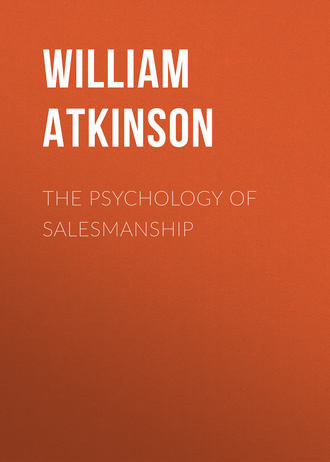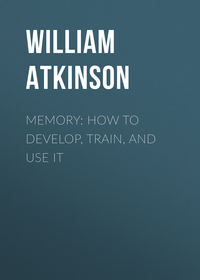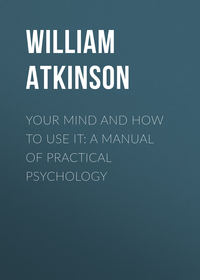 полная версия
полная версияThe Psychology of Salesmanship
The Intelligent Buyer. These people depend almost entirely upon reason and judgment. They are scarce. When you meet one of them, drop all attempts to play upon weak points, prejudices or feelings, and confine yourself strictly to logical and rational statements, presentation of your proposition, and argument thereon. Do not attempt sophistry, argument from false premises, or other fallacies. He will detect them at once, and will feel indignant. Talk straight from the shoulder, and confine yourself to facts, figures, principles, and logic.
So far we have dealt with the voluntary or outer mind of the buyer. Let us now consider his involuntary or inner mind. There are many other terms used by psychologists to designate these two phases of mind – the important fact is that there are two phases or planes of mind which are operative in a sale. Let us see how they work, rather than what they are, or what they are called.
Discarding, for the time being, the current psychological theories and terminology, let us take a plain look at the facts of the case. A little consideration will show us that there are two parts to a man's mind – or two phases of activity. In the first place, there is a part of one's mind which acts as does the mind of the higher animal, the savage, the child. That is, it acts upon impulse and without restraint of the will. Its attention is easily attracted, but held with difficulty unless the interest and curiosity is awakened. It is curious, fond of novelty, inquisitive, impulsive, easily persuaded in certain directions, susceptible to impressions, amenable to suggestion, imitative, subject to panic, apt to "follow my leader," emotional, depending upon feeling rather than upon reason, subject to persuasion and coaxing, and acting almost automatically in response to awakened desire. Let us think of this part of the mind as the inheritance of the race from the past – the instinctive mind – the elemental mind of the race before Intellect mounted its throne. This part of the mind is possessed by every individual of the race. No matter how highly developed the individual may be, he has this part of the mind. No matter how much he may be in control of it, it is always there as a background and basis of his other kind of mind. The difference in the self-control of individuals depends almost altogether upon the other part of the mind, which we shall now consider – the Voluntary Mind, in which the Intellect and Will are the predominant elements. The phase which we have just considered may be called the Involuntary Mind, in which Desire and Feeling are the predominant elements.
The Voluntary Mind has come to man in the course of evolution. It is not nearly so highly developed in the majority of people, as one might at first suppose. The majority of the race have the Involuntary Mind predominant, and are swayed more by feeling and desire than by intellect and will. Those in whom the Voluntary Mind is highly developed place the intellect over the feelings – the will over the desires. They submit their feelings to the inspection and approval of their intellect, and hold their desires in check by their will. We are in the habit of thinking of will as a something which acts – but in the majority of instances it is found to be employed in checking action of the desires – in holding back rather than in pushing forward. One of the chief duties of the developed will is that of inhibition, or restraint. And inhibition depends upon the decision of the judgment or intellect. The animal, savage, or child has but little power of this kind – the average individual has more than the child or savage but less than the developed individual – the developed individual has better self-control, and subordinates his emotional desires and feelings to his judgment and will, by inhibition or restraint. Every individual has both of these phases of mind – the Involuntary and Voluntary – the latter, however, being manifested in an infinite variety of degrees of development and power. Back of every Involuntary Mind is to be found the protecting Voluntary Mind – and likewise, back of every Voluntary Mind, no matter how strong it may be, there is ever the Involuntary Mind chafing under restraint and striving to escape its master's eye and express itself in its own way. And the master often relaxes its attention, or gets tired of its strenuous task, and then the hidden nature "plays while the cat's away."
Perhaps the Salesman may be able to remember this classification of the two phases of the mind, by picturing them as two partners engaged in business. The Salesman is trying to secure the trade of the firm. The one brother is an easy-going fellow, possessing curiosity and childish interest, capable of being "jollied," persuaded and coaxed, and apparently acting always from his momentary desires and feelings, desirous of appearing well in the eyes of others, and anxious to make a good impression, finding it easier to say "Yes," than "No" – easier to fall in with the wishes of others than to oppose them, being vain and complaisant. This partner's name is "Easyboy." The other partner is an entirely different sort of fellow. He is cold and calculating, manifesting very little feeling or emotion, submitting everything to his reason and judgment, not moved by prejudices for or against, driving a close bargain and resenting attempts to coax or drive him. His name is "Hardfellow."
In the firm of "Easyboy and Hardfellow," the work is divided. "Easyboy" has much to do about the place, attending to many things for which his temperament specially fits him. "Hardfellow," however, does the buying, for experience has taught him that "Easyboy" is not fitted for the task, being too much under the sway of his feelings and being too easily influenced. "Easyboy" never could say "No," anyway – but "Hardfellow" finds it almost as hard to say "yes." So "Hardfellow" does the buying, but "Easyboy" always "hangs 'round" when a salesman is talking, for he is naturally inquisitive, and, being jealous, rather resents "Hardfellow's" authority in the matter. Sometimes he breaks in, and "Hardfellow" lets him have his say, and at times indulges him in minor purchases, for being a partner he must accord him some consideration in spite of the arrangement regarding duties. A strange thing is that "Easyboy" is possessed of the notion that he would make an ideal buyer, far better than "Hardfellow" in fact, and he loses no opportunity of manifesting his supposed quality, notwithstanding the fact that he usually makes a bungle of it.
For "Hardfellow" is often so busy that he cannot give his full attention to the business of buying; then again he becomes tired and at such times his judgment is not so good, and he is apt to be influenced by "Easyboy" at such times; and, again, he becomes interested in one feature of the purchase and overlooks the others – at such times "Easyboy" "gets in his fine work," and takes a hand in the buying. The Salesmen who visit the firm are fully aware of this condition of affairs, and plan things so as to have "Easyboy" on hand and able to play his part. They can do anything with him, and the more he is in evidence the better are their chances. If he had his way he would buy corner lots in the moon, or gold-bricks minus the plating. He likes to say "Yes" when coaxed, jollied or led. But the Salesmen having a straight business proposition of merit get along well with "Hardfellow," for he is reachable on such lines when logically presented and explained in a business way. Even such Salesmen, however, find "Easyboy" a valuable ally, for he often gets them a hearing when "Hardfellow" is busy or otherwise not disposed to listen. And so, they all find it an important question to get "Easyboy" on the scene at "Hardfellow's" elbow. Some claim to have discovered a method whereby they can "sidetrack" "Hardfellow" and get "Easyboy" to do the buying. And rumor even has it that there have been unscrupulous individuals who have happened around when "Hardfellow" was taking his siesta after a full dinner, and who then played upon "Easyboy's" weakness in a shameful manner. The firm deny these rumors, but there is an old gold brick holding back a door at the back part of the store; and a big bundle of worthless shares in a nicely printed gold-mine and a deed for a quarter-section of the blue sky, in the safe – so there may have been something in the tale, after all.
Every mind is an "Easyboy and Hardfellow" firm. Both partners are in evidence. In some cases "Easyboy" has far more sway and influence than his more capable partner; in others they have equal authority; in a third, "Hardfellow" asserts his right and ability, and "Easyboy" has to take a back seat under protest. But the same principle is true of them all. And this fact is taken into consideration by men of the world who understand the true state of affairs. If anyone doubts this statement of psychological facts, let him analyze himself, and look back over his own experience. He will find that "Easyboy" has played him many a sad trick in the past, and the "Hardfellow" has been "off his job" more than once. Then let him begin to analyze others with whom he comes in contact – he will see the same state of affairs existing there. And yet there is no mystery about the matter – it is all in accordance with known psychological laws. Some writers on the subject of Salesmanship rather solemnly assure us that the "Easyboy" part of the mind is a "higher mind" – but it is not. It belongs to the instinctive stage of mental development, rather than to the rational. It is an inheritance from the past – that past in which men were moved entirely by feeling and emotion, before reason came to its present stage of development. If it is "higher" why is it a fact that the lower races and individuals manifest it to a greater extent than the higher ones? This part of the mind gives vitality and energy to one, but unless it be controlled by Intellect and Will it is apt to prove a curse.
CHAPTER VI
THE PRE-APPROACH
Nearly all teachers of or writers upon Salesmanship lay much stress upon what is called "The Pre-Approach," by which term is indicated the preliminaries leading up to the Approach or Interview with the Buyer.
What we have said under the head of "The Mind of the Salesman" is really a part of the Pre-Approach, for it is in the nature of the preparation of the mind of the salesman for the interview with the buyer. But there is more than this to the Pre-Approach. The Pre-Approach is the mapping out of the campaign – "organizing victory" it has been called. It is the accumulation of ammunition for the fight, and the laying out of the strategy. Macbain says: "The Pre-Approach is the groundwork upon which the salesman builds. It comprises all the information obtainable by him that will be of importance in making his approach in selling the customer. * * * A sale, in fact, resembles chimney-building, in which it takes more time for preliminary scaffold-making than it does to build the permanent structure once the scaffold is made."
In the first place, an important part of the Pre-Approach is a correct and complete knowledge of your goods. Too many men rush to the Approach without knowing what they have to sell. It is not enough to know brands and prices – one should know his goods from top to bottom, inside and outside, from the raw material to the finished article. He should feel perfectly at home with his goods, so that he may have full information regarding them on tap, and thus have his mind free for the strategy of the sale. A little close, earnest intelligent study of one's line of goods will not only supply one with an efficient weapon, but will also impart to him a sense of certainty and confidence that he cannot have otherwise. What would be thought of a teacher of natural history who did not understand animals? And yet many salesmen are equally as ignorant about their subject.
The salesman should understand his goods so thoroughly that he could write a treatise on them, or demonstrate them before an audience of experts or of persons entirely in ignorance of them – the latter being probably the hardest task. He should be able to explain their particular virtues and characteristics to a man old in the same line, or to explain them simply and plainly to one who had never seen them or who was ignorant of their uses. We know of one salesman who was asked by his little boy to explain a cash register to him, and who complied with the request. He told us that he learned more about his cash register in the process of that explanation than he had acquired in even the process of the technical demonstration in the "salesman's school" at the factory. It is not always policy for the salesman to air his knowledge of his goods to his customer – such a course would generally bore the latter – but he should know all about his goods, nevertheless. The man who knows his goods in this way plants his feet on the solid rock and cannot be swept away, while the man who builds on the shifting sand of "half-knowledge" is always in danger.
But the more popular branch of the Pre-Approach is the knowledge of the customer. Get as many points regarding the characteristics, habits, likes and dislikes of the customer as possible. Find out as much as you can about his trade, and manner of conducting his business, as well as his business history. Macbain says: "There is really no information about a prospective customer that can be said to be valueless. On the other hand, a knowledge of one or two of the characteristics of the man to be approached may be considered sufficient, the ready intuition of the salesman being relied upon for the rest. It is assumed, of course, that a salesman will be able to call his man by name, pronouncing the name correctly upon the very first interview. This is the prime requisite, and the remaining knowledge should be grouped about this in the order of its importance."
The data regarding your prospective customer is obtainable in many ways. Much of it you may obtain from your house if they have had previous dealings with him. Other salesmen will also add to the data, but one must be on the lookout here and not allow himself to be prejudiced against the customer, or frightened by adverse reports regarding his manner and characteristics coming from other salesmen. Pierce says: "It would seem that the good characteristics of the prospect are desirable to learn. But it is a conviction that by denying to one's self the unfavorable things said about your prospect, you will not accentuate the very qualities you hope to obviate. One attempt at a sale is recalled where the prospect was said to be 'the meanest man on earth.' Almost terrified by the description, the salesman went at the prospect the wrong way; displeased him; lost the sale."
Hotel clerks – or better still, hotel proprietors – are often very well informed regarding merchants in their town, and often valuable information may be obtained in this way, although the judgment and experience of the hotel people must be appraised before basing one's own opinion regarding the customer. Other customers may also be diplomatically pressed into service in obtaining information regarding their competitors, although allowance must always be made for the personal bias in such cases. It is a good idea for the salesman to make a record of these advance reports, so as to have them on file where he may refer to them when needed. Some salesmen have a card index devoted to this purpose, which they have found very useful.
Another, and a very important point about the Pre-Approach is that of developing the proper Mental Attitude in yourself. You must get yourself right first, before you can get anything else right. Pierce says regarding this: "Someone has said that the greatest bane to selling goods is fear. As a matter of fact, the only thing you are afraid of is that you won't make the sale, – get the check. But, if you waive this point, and say, 'Now, I don't care whether I get this sale or not. I do know this: I am honest, my goods are honest, and if this man does not want them there are plenty of men who do,' you will find the fear melting like the mist before sunshine. Fear cannot live in the presence of your smile, your confidence, your knowledge of the business and your industry."
In this connection, re-read what we have said to you regarding the "I" and "Self-Respect" in the chapter entitled "The Mind of the Salesman." This chapter was written to cover just such cases as the one in question. If you can realize the "I" within you, your fear will disappear quickly. Remember, "there's nothing to fear but Fear."
Many successful salesmen state that they overcame their early fear and timidity by filling themselves with auto-suggestions that they were calling on the customer for the purpose of doing him a good turn – that it was a good thing for the customer that the salesman was calling on him, although he did not know it – and that he, the salesman must let nothing stand in the way of doing that good turn to the customer, etc. As ridiculous as this may appear to some, it will be found to work well in many cases. And it is based upon truth, too, for if the goods are right, and the prices are likewise, the salesman is doing the customer a good turn.
And right here, let us impress upon you the necessity of working yourself up to the point of believing thoroughly in your own proposition. You must get yourself into the state of mind in which, if you were in the customer's place, you would surely want to take advantage of it. You must convert yourself before you can expect to convert the customer. We know an ad. man who tells us that he never feels satisfied with an ad. that he is writing until he can make himself believe that he wants to buy the article himself. And he is right. And the salesman will do well to take a leaf from his book. Enthusiasm and belief are contagious. If you believe thoroughly in a thing, you run a much better chance of making others believe in it also, than if you feel otherwise. You must learn to sell to yourself first, then you may sell to the customer.
W.C. Holman, in "Salesmanship," says: "One cannot make others believe what he himself believes, unless he himself is an earnest believer. Dwight L. Moody swayed enormous audiences by the simple power of his own wonderful earnestness. No one could listen to Moody without saying: 'This man believes absolutely every word he is speaking. If he feels what he says so tremendously, there must be something in it.' If every salesman realized how largely the attitude of the 'prospect' depended upon the salesman's own mental attitude, he would be as careful to get into the right frame of mind when he started out to approach a prospect as he would be to carry a sample case. It is a simple matter for him to do this. All that is necessary is for him to 'take account of stock' just before he starts out – to enumerate to himself all the strong, convincing points in his proposition – to consider the good high qualities of the goods he is selling – run over in his mind the splendid characteristics of his house – think of the great number of customers who have bought his product – and of the supremely satisfying reasons why other customers should buy his goods. In other words, before a salesman starts to sell other men, he should sell himself. He should make this sale to himself at the beginning of every day's work."
The student should acquaint himself thoroughly with the creative force of Suggestion and Auto-Suggestion in Character Building, and in producing and maintaining the proper Mental Attitude. The volume of this series entitled "Suggestion and Auto-Suggestion" gives both the theory, principles and methods of applying Auto-Suggestion in the directions named. One need no longer be a slave of his Mental Attitude. On the contrary he may create and preserve the Mental Attitude he deems advisable and necessary at any time.
Mr. W.C. Holman, one of the best of the inspirational writers on Salesmanship, gives the following interesting instance of the use of Auto-Suggestion by a salesman. He says: "One of the best salesmen the writer ever knew got up what he called his catechism. He used to put himself through it every morning before starting out. Oftentimes he repeated it aloud if he had the opportunity. The questions he would repeat in a quiet tone, but the answers he would pronounce with all the earnestness of which he was capable. His catechism ran somewhat as follows:
"Am I working for a good house? YES!
"Has my house the reputation and prestige of being one of the best in its line? YES!
"Have we made hundreds of thousands of sales like the sales I am going to make to-day? YES!
"Have we an enormous body of satisfied users? YES!
"Am I selling the best goods of the kind made anywhere in the world? YES!
"Is the price I am asking a fair one? YES!
"Do the men I am going to call on need the article I am selling? YES!
"Do they realize that now? NO!
"Is that the very reason I am going to call on them – because at present they don't want my goods, and haven't yet bought them? YES!
"Am I justified in asking a prospect's time and attention to present my proposition? BY ALL THE POWERS, YES!
"Am I going to get into the office of every man that I call on, if there is any earthly way to do it? YES!
"Am I going to sell every man I call on to-day? YOU BET I AM!"
Referring to the above "catechism" of Mr. Holman, we would say that if a man would work himself up to the point of asking and answering these questions in earnest, and would carry the spirit thereof through the day, he would render himself almost invincible. A spirit like that is the spirit of the Light Brigade, of Napoleon, of the Berserker Norseman who made a way for himself. Such a man would make opportunities, instead of begging for them. Such a man would be inspired. This is Auto-Suggestion raised to the Nth Power. Try it – you need it in your business!
The second phase of the Pre-Approach is that of obtaining an interview with the prospective customer, generally known as "the prospect." In many instances the salesman is able to secure the interview by simply walking into the presence of the prospect, the latter being in full view in his store or office and no intermediary being present to intercept the approach. In such cases the second phase of the Pre-Approach is passed over, and the actual Approach is entered into at once. But in other cases, particularly in the large office buildings of the principal cities, the prospect is found to be in his private office, and the salesman's advance is halted by a clerk, or even an office boy, and there are certain preliminaries to be gone through with before an interview may be obtained. In many cases, "big" men (or those who wish to be considered "big") surround themselves with so much formality and red-tape that it is quite a feat to run the gauntlet of the guardians of the inner temple, and much tact, diplomacy, presence of mind, and often strategy is required of the Salesman in order that he may "get at his man."
Macbain, in his work entitled "Selling," says of this stage: "Between the pre-approach and the actual approach sometimes lies a trying time for the salesman. It is no uncommon thing for a prospective customer to keep a salesman waiting, either outside the office door and out of sight, or inside and in the presence of the prospective buyer. This is known as 'breaking the salesman's nerve.' It is often done with the idea of deliberately making the salesman nervous and consequently unable to make such an approach as otherwise would be possible. Perhaps one of the most common forms of this is seen when the prospective customer appears to be very busily interested in something at his desk and allows the salesman to stand an indefinite length of time and then turns suddenly upon him. This is especially disconcerting to the young man, but the experienced salesman recognizes it as an indication that either the man is very busy and actually hates to take his mind off his work, or that he is afraid of being talked into something that he will later regret. The salesman consequently shapes his introduction accordingly and will in no wise be disconcerted by this attempt as it will enable him to study carefully the outward characteristics of the man whom he is about to approach."
In many cases this waiting is forced on the salesman by a prospect who also knows something of the laws of psychology – for such knowledge is not confined to the salesman by any means, the buyer having posted himself in many cases. In the game of checkers or draughts quite an important advantage accrues to the player securing what is technically known as "the move," which, however, is a very different thing from the "first play." There is in the psychology of the sale, or of the interview between two people of equal strength, a something which corresponds very closely with "the move" in checkers. This something gives a decided advantage to the person securing it, and it is worth striving for. This something is subtle and almost indescribable, although apparent to every one who has dealings with his fellow men. It seems to be a matter of mental balance and poise. The salesman, if he be well balanced and poised, is "positive" to the buyer, the latter being in a listening, and therefore passive, attitude. So far the salesman has "the move," which however he may later lose if the prospect plays scientifically. Well, to get back to the "waiting" stage, the prospect by disturbing the salesman's poise, and "breaking his nerve" by keeping him waiting on the anxious bench in a state of suspense, often manages to get "the move" on him, unless he understands the psychology of the process and accordingly avoids it. Suspense is the most nerve-breaking mental state on the psychological list, as all realize who have experienced it. Beware of losing "the move."









